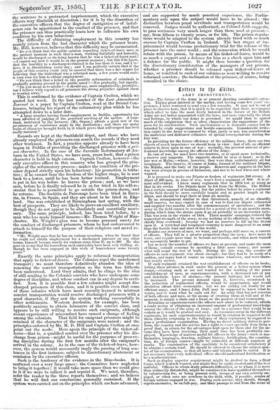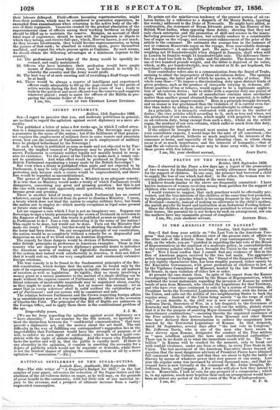fetus to the &titer.
ARK Y I MTE 0 VE3LENT.
Six—The future of the Army is at present drawing considerable atten- tion. Taking great interest in the matter, and having some kw years' ex- perience, I have ventured to' send you a few remarks. It may not be out of
place to observe here, that it is much to be regretted that those newspapers which affect to take the most lively interest in the future of the British
Army are not better acquainted with the laws, and more especially the ideas
and feelings, by which our Army is governed : we might then be spared much of the empiricism that so often characterizes the suggestions of the press for its amelioration. Such amelioration as is desirable cannot but be retarded by crude suggestions and hostile comments. Considerable irrita- tion exists in the Army occasioned by what, justly or not, was considered as the malicious and dishonest criticisms of special correspondents during the late war.
In providing for the future efficiency of the military force, them are two objects of much importance we should keep in view : first of all, an efficient reserve to draw upon incase of war ; secondly, the greatest amount of pro- fessional knowledge among the officers of the Army.
In case of war, we must have two reserves, or to speak more technically, a reserve and supports. The supports should be near at hand ; as in the late war at Malta,—where, however, they were then unfortunately all but imaginary. The reserve, of course at home, formed of the military Depots, the Ifilitaa, and the body of thepeople. Reserves and supports iu the late war were always in process of formation, and not to bo had when and where wanted.
It is proposed to make our Depots or feeders of regiments 200 strong. A depot of 200 men, in time of war, won't feed R regiment of 800. It is al- most self-evident. I know many regiments that in 1854 lost as many as that in six weeks. The Depots must be fed from the Militia. The Militia has a certain omount of training ; but the soldier before he joins a regiment in the field should be more carefully taught and at greater length at the "depot, and should be kept there at least six months.
By an arrangement similar to that threatened, namely of an absurdly small reserve, we may expect in case of war to find our depots exhausted and emptied two months after the commencement of operations ; and the army in the field cannot be recruited for a period of five or six months more, during which time the drains upon it go on probably in an increasing ratio.
This was seen in the winter of 1854. Three months' campaign reduced the numerical strength of the army, to say nothing of its efficiency, by one-half, chiefly from overwork ; because we had no reserves to till up the drams upon it. A wretched and misplaced economy is more dangerous to an army than the hostile lead and steel of the world.
Besides our reserves of men, we want, and perhaps still more so, a reserve of officers. They fall in a greater proportion than the men ; have more to learn, and require more time to become serviceable, and when most wanted are necessarily harder to get. Let us keep the number of officers we have at present, and make the most of them ; consult economy by spending a little more money, and secure
what will stand the test of work. During the late war, the number of officers to each regiment was about enough ; but they had to be made of a sudden, and many had of course no experience whatever, and were there- fore nearly useless.
If each regiment retained the war establishment of officers on its books, letting them advance in rank under the present or a better system when found,—classing such as are nut wanted for the working of the peace
establishment of men' as supernumeraries, with a decreased rate of pay and indefinite leave of absence,—the present half-pay list would not
be increased. The present demand upon it, however occasioned by the reduction of regimental officers, would be perpetuated, and would doubtless offend_ false economists : but we are calling out loudly for an efficient army, and I fancy John Bull may be supposed to know what he wants, and to want what he calls out for. An army that has not reserves of both officers and men, or the means of creating them at will and et the moment, is simply a Asia and a fraud on the pockets of real economists.
Retaining as supernumeraries the officers now about to be reduced, affords a ready means of obtaining an increased amount of professional knowledge among the officers of the army at large ; and in a manner that would be es certain as it would be gradual and easy. As vacancies occur in the different regiments, let such supernumeraries as would in rotation be required to fill _them (thereby. returning to the full-pay of their regiments) be required to
pass a professional examination. Having no direct military dutica.to per- form, the country and the service has a right to exact specially from them a
proof that, in return for the advantages kept open for them and for the in- come they have been receiving, their spare time has been profitably em- ployed. Knowledge of matters useful for officers in the Army—such as ma- thematics, languages, drawing, .military history, fortification, the constitu-
tion, ire. of foreign armies—might be estimated at different numbers of marks. The examination of the candidate to be considered satisfactory if
he obtains a certain total. He should be allowed to choose the subject mat- ter of his examination, so that all tastes and talents might be suited. It is not necessary that every individual officer should understand fortification or be a mathematician.
Such as display superior acquirement might be drafted to form a Staff Corps, which is much wanted, and might thus be easily created and of the best material. Officers to whom study presents difficulties, or to whom it is more than ordinarily distasteful, might be considered to have qualified themselves by volunteering for, or being present with, troops of our own actively en- gaged, or when ours are nowhere in the field, with, if possible, armies of foreign nations engaged in war. During such service, they should, though supernumeraries, be on full-pay, and their passage to and from the scene of their labours defrayed. Field-officers becoming supernumeraries, might from their position, which may be considered to guarantee experience, be exempted from examinations when returning to the active body of the offi- cers of their regiments. Vacancies created by the gradual absorption of the supernumerary class of officers among their working brethren on full-pay should be filled up to maintain the reserve. Ensigns, on account of their total want of experience, should be kept with the regiments or ddpots to which they belong, and receive full-pay, which, Heaven knows, is not much. As they become Lieutenants, they would become supernumeraries, as being the juniors of that rank ; be absorbed in rotation again, prove themselves qualified, and repeat the whole process again as Captains. By such means, we should obtain the following advantages at a minimum expense to the country. 1st. The professional knowledge of the Army would be speedily in- creased, and airily maintained. 2d. Officers who have mistaken their profession would have ample means of discovering their error, and be induced to rectify it ; whereby the country and the Army would profit. 3d. The best way of at once creating and of recruiting a Staff Corps would be at hand.
4th. There would be always a reserve of intelligent and experienced officers ready adequately, to fill up the gape created by the perils of active service during the first four or five years of war ; ready to train in the quickest and most efficient way the reserves and supports wherever placed ; ready to assist the officers of the Militia in pre- paring the ultimate feeder of the Army.
I am, Sir, ONE OF THE CRIMEAN LIGHT DIVISION.



























 Previous page
Previous page